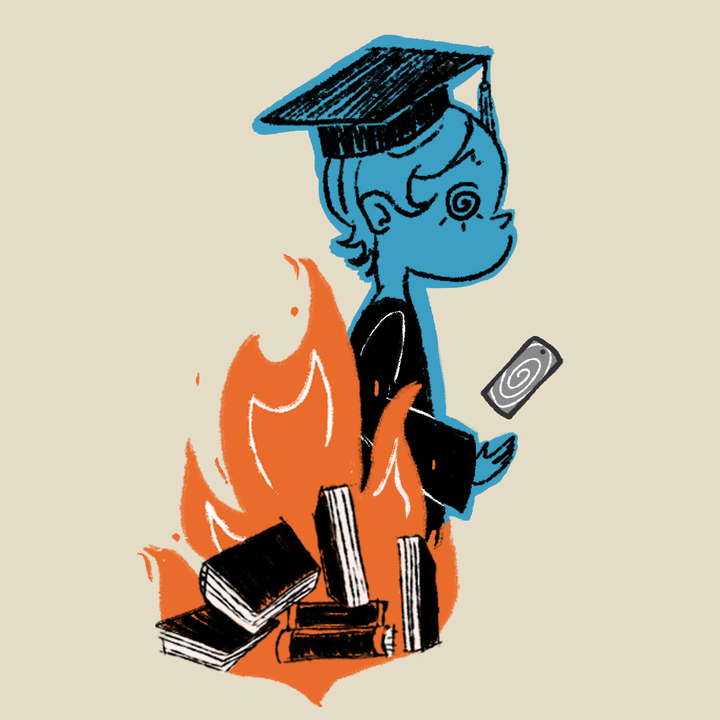It’s no secret that our nation currently faces political divides like never before. Swing state results from this past election show that the closest percentages were in Pennsylvania and Wisconsin, with mere 0.4% differences in both—yet notably, for opposing parties. Social media only worsens this divide; it is nearly impossible to avoid opening our phones and seeing posts advocating for or against Trump’s new policies as they pump out daily. Indeed, tensions are high with the government funding freezes, cutting the Department of Education, ICE raids and more.
It is crucial to remember that these election results do not call for more yelling to convince the other side—they call for reevaluating our educational system. Some may wonder why our educational system is vital to modern-day politics, with critics arguing that voting is a matter of personal values. As a future educator, I’m here to tell you that education has everything to do with politics.
Experts have shown that you can infer who a friend or family member voted for based on the quality of their education. A scatter plot organized by Vanderbilt University shows the clear correlation between higher education and voting for Kamala Harris.
The chart shows each state’s percentage of residents with bachelor’s degrees or higher and places them in the blue zone for Harris and the red zone for Trump. Around the 35% mark (meaning 35% of that state’s residents have a bachelor’s degree or higher), the states display a stark shift from the majority of Trump voters to Harris. This data overwhelmingly supports the argument that the higher a voter’s education, the more likely they are to vote for Harris.
Conversely, states that commonly restrict their educational systems, such as Texas, Florida, and Missouri, are all in the “Trump zone,” at or below the 35% mark. These states are also the most significant book banners—most notably Florida, which, according to Central Florida Public Media, has banned an overwhelming 4,500 books, most that followed after Governor DeSantis started signing new laws in 2023
Four thousand five hundred banned books are a tremendous number; I implore you to imagine how many shelves it would take to hold all of them. According to Stephana Ferrell, director of the Florida Freedom to Read Project, the connection between banning books and limiting crucial material lies in the number of banned books that regularly appear in AP exams, which provide students with college credit. This alarming correlation shows how these bans harm students’ college educations and high school diplomas.
Since then, DeSantis has signed a bill to limit the number of books that can be challenged. This bill follows DeSantis’ admission that his law allowed political organizations to “weaponize” book banning for “political purposes.”
However, this is not just a matter of which states need protection from classroom material restrictions. Growing up in Southern California, I have experienced the assumption that my education has never been threatened. Unfortunately, this does not ring true in Temecula, where I was born and raised.
My junior year of high school was spent watching my school board become flooded with right-wing members hand-picked by an extremist church. Moreover, these school board members introduced new rules, including banning critical race theory (CRT) due to the supposed issue of racial guilt white students could experience.
What is stunning about this is that Temecula’s curriculum does not include CRT in the first place. However, the board still implemented a rule banning it as a political attack. Following this ban, students, including myself, staged district-wide walkout protests.
I was involved in local politics for many of these battles, attending school board meetings where residents from both parties yelled and fought over issues that had little to do with improving my education. Following this experience and how it defined my attitude towards politics, I’m tired of shouting. It seems like these days, people care more about being angry with politics than solving the underlying issues of our education.
Feeling helpless is normal. Feeling tired is normal. Feeling angry is normal. But I urge us all to push past our anger or desire to give up and instead fight back in ways that will help every US citizen—and not just politically. Advocating to protect our education systems from restrictions such as banning books and removing critical race theory is vital. We can see how these actions result in fewer college degrees, which in turn creates voters who aren’t as educated going into the polls and, based on correlational patterns, vote for Trump.
If we were all offered the same educational opportunities, what would political conversations look like online and in person? It is also crucial to be involved in local politics and elections and use well-researched claims in political discussions. Something as simple as fact-checking can go a long way in a nation divided by misinformation and emotions. If everyone questioned and researched the articles, news stories and social media claims they saw, we could all formulate personal opinions based on more of the same information: education is politics.






